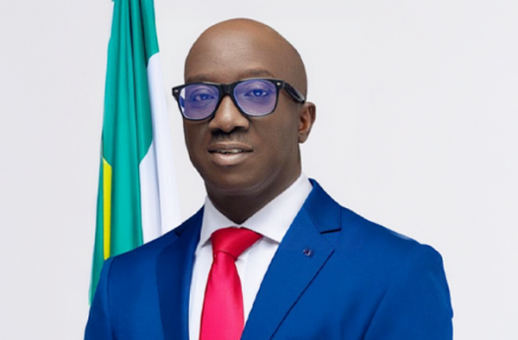News
Amotekun Must Not Become Another SARS, Soyinka Warns

Nobel Laureate, Prof. Wole Soyinka, has warned that South-West Security Network Agency, also known as Amotekun, must not become another Special Anti-Robbery Squad (SARS) of the Nigeria Police Force.
Soyinka stated this on Saturday, while featuring on Arise TV.
The revered author noted that men of the Amotekun Corps, must be trained on the issue of ethics, so that they do not become more brutal and ruthless than the defunct SARS.
Ondo and Oyo States have launched the security outfit, which was endorsed by six South-West states last year.
However, there have been allegations of recklessness and extrajudicial killings against the security outfit, especially in Oyo State.
READ ALSO: Operation Amotekun: Yoruba World Congress to hold Solidarity Walk Monday
Soyinka said, “I have told them anytime you want us to come and assist, we will come even if it is just on the ethical session so that as you are training them to defend us, we are also training their minds so that Amotekun does not become another SARS, very important. We must do everything together.”
(Daily Post)
News
Edo Postpones School Resumption Date

Edo State Government has postponed the resumption of all public and private schools in Edo Central Senatorial District where Governor Monday Okpebholo hails from.
The postponement of the resumption date may not be unconnected to the rising insecurity in the area, as it would be recalled that violent protest a few days ago engulfed Ekpoma, Edo Central over incessant kidnappings in the locality.
The angry protesters vandalised the Palace of the Onojie of Ekpoma, just as shops were looted, an act the state government had condemned in strong terms.
READ ALSO:Edo Targets 2.2 Million Children For Measles, Rubella Vaccination
In a statement, the state Commissioner for Education, Dr. Paddy Iyamu, said the school resumption postponement was till further notice and to enable them address some exigencies to improve the welfare of the pupils.
According to him, “The new date of resumption will be duly communicated to the public in due course.
“Parents, guardians, and all education stakeholders within Edo Central Senatorial District are kindly requested to take note of this development and comply accordingly.”
News
NAF Launches Attack On Terrorists In Borno

The Nigerian Air Force, NAF, operating as part of the joint task force of Operation Hadin Kai, has carried out a coordinated air interdiction at AbbagaJiri in the Timbuktu Triangle, Borno State.
According to Air Commodore Ehimen Ejodame, Director of Public Relations and Information of NAF, the air strikes successfully paved the way for ground troops.
He explained that the operation was based on actionable intelligence from multiple sources, which confirmed the presence of terrorists, their structures, and concealed logistics facilities in the area.
Ejodame stated that NAF air assets were deployed in integrated surveillance and precision strike roles to target identified threats.
READ ALSO:NAF Hits Bandit Logistics Hub, Neutralises Many In Zamfara
The operation aimed to degrade terrorist capabilities, deny them sanctuary, and shape the battlefield for ground forces, all while strictly adhering to rules of engagement and protecting civilians.
He added, “The Identified terrorist structures were decisively engaged and destroyed, denying the terrorists freedom of action, while a follow-up engagement neutralised armed elements observed converging on the location.”
“Subsequent advances by ground troops into the area confirmed the effectiveness of the air strikes and validated the success of the joint air–land operation.”
Speaking on the mission, Chief of the Air Staff (CAS), Air Marshal Sunday Aneke, said, “The success of the mission reflects the NAF’s resolve to dominate the air domain in support of joint operations.”
READ ALSO:NAF Hits Bandit Logistics Hub, Neutralises Many In Zamfara
Aneke further emphasized that the operation highlighted the service’s commitment to providing precise and decisive air power in support of ground forces.
In his words, “We will continue to deny terrorists freedom of movement, sanctuary, and logistics wherever they seek to hide. Air operations will remain relentless and intelligence-driven.”
“Our operations are carefully planned and intelligence-led, ensuring maximum effect on hostile elements while safeguarding innocent civilians.”
READ ALSO:NAF Announces Two-hour Road Closure In Abuja For 10km Walk
“The Nigerian Air Force will sustain pressure until terrorist networks are completely dismantled.”
He further noted that the operation showcased NAF’s aggressive stance, precision employment of airpower, and dedication to sustained joint operations.
Aneke added that such missions play a crucial role in enabling ground troops to maintain momentum and deliver decisive outcomes against terrorist networks threatening lives, property, and Nigeria’s national security.
News
Lagos Parks To Close For Maintenance – State Govt

The Lagos State Parks and Gardens Agency, LASPARK, has announced that all public parks under its management across the state will be temporarily closed for routine maintenance and upgrades.
In a statement released on January 9 and shared via its official platforms early Saturday, LASPARK said, “All parks under our management will be closed to the public from January 12 to January 31, 2026.
“This follows increased visitor activity during the recent festive season.”
The agency listed several popular recreational spots that will be affected, including “Ndubisi Kanu Park, Alausa JJT Park, Dr. Finnih Abayomi Park in Oregun, and all other LASPARK-managed parks across Lagos State.”
READ ALSO:
Explaining the reason for the closure, LASPARK added, “The temporary shutdown is necessary to carry out essential landscaping, facility repairs, and general upgrades to ensure that our parks remain safe, clean, and enjoyable for residents and visitors.”
The agency also stressed that the exercise aligns with its broader mandate, noting, “This maintenance programme is part of our commitment to providing well-maintained green spaces that promote relaxation, wellness, and environmental sustainability.”
LASPARK assured residents that “all parks will reopen at the end of the maintenance period.”

 Metro5 days ago
Metro5 days agoEdo widow-lawyer Diabolically Blinded Over Contract Seeks Okpebholo’s Intervention

 News4 days ago
News4 days agoExpert Identify Foods That Increase Hypertension Medication’s Effectiveness

 Politics4 days ago
Politics4 days agoAPC Leaders, Tinubu/Shettima Group Call For Wike’s Removal As FCT Minister

 Politics3 days ago
Politics3 days agoWike A ‘Pestilence’ On Rivers, I Resigned Because Of It – Ex-Commissioner

 Politics3 days ago
Politics3 days agoWike: Why Removing Fubara Will Be Difficult – Ex-Commissioner

 Headline3 days ago
Headline3 days agoScience Discovers Why Hungry, Broke Men Prefer Bigger Breasts

 Politics4 days ago
Politics4 days agoWhy We’re Impeaching Fubara — Rivers Assembly

 Politics4 days ago
Politics4 days ago‘We’ll Do Everything To Stop It’ – APC Rejects Fubara’s Impeachment

 Headline4 days ago
Headline4 days agoRussia, China Afraid Of US Under My Administration — Trump

 Business3 days ago
Business3 days ago14 Nigerian Banks Yet To Meet CBN’s Recapitalization Deadline [FULL LIST]




















